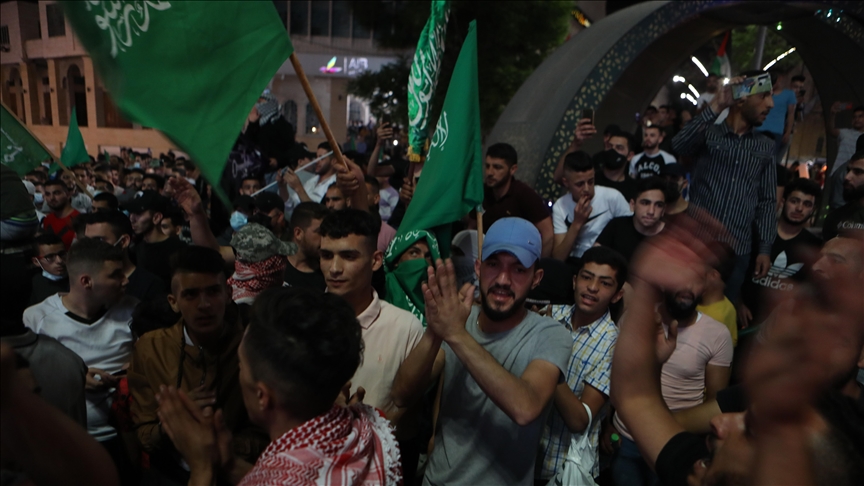What is behind the latest tension in Jerusalem, Palestine?
Rightwing Jewish groups attempt to take control of Sheikh Jarrah, Damascus Gate, and gain foothold in Al-Aqsa Mosque
 Palestinians stage a protest against attacks by Israeli police with tear gas, rubber bullets, and stun grenades on Palestinians at Masjid al-Aqsa, in Nablus, West Bank on May 11, 2021. Photo: Mamoun Wazwaz - Anadolu Agency
Palestinians stage a protest against attacks by Israeli police with tear gas, rubber bullets, and stun grenades on Palestinians at Masjid al-Aqsa, in Nablus, West Bank on May 11, 2021. Photo: Mamoun Wazwaz - Anadolu Agency
JERUSALEM
For over the past few days, hundreds of Palestinians have been injured and detained by the Israeli authorities, a series of clashes have erupted in the holy city of Jerusalem.
The trigger of this fresh escalation was an order by occupation authorities restricting Palestinian gathering at Damascus Gate as well as attempts to evacuate Palestinians from their homes in the Sheikh Jarrah neighborhood.
Speaking to Anadolu Agency, Abd-Allah Marouf, a teacher of Islamic history at Istanbul’s 29 Mayis University said extremists in Israel are taking advantage of Prime Minister Benjamin Netanyahu’s precarious position and his desire to stay in power.
“The Israeli occupation may not want the escalation on several fronts. But as a result of the political ambitions of extremist groups in Shaikh Jarrah, Damascus Gate, and Al-Aqsa compound, it had to deal with several fronts,” he said.
He said extremist groups are attempting to reap the political harvest by taking control of Sheikh Jarrah and Damascus Gate, besides finding a foothold for Jews in the Al-Aqsa Mosque, which means changing the status quo in the city.
“They want to impose a new fait accompli that Jews pray openly in the mosque,” Marouf added.
He charged that Israeli media was undermining these street protests by describing those engineering them as a rioting minority. But they failed as youth took to social media platforms to publish the facts.
“The Israeli media is trying to publish misinformation. This is an attempt to trick Palestinians into the illusion that the police will not allow extremists to continue provocations,” he added.
Tensions have been running high in the Sheikh Jarrah area since last week after an Israeli court ordered the eviction of Palestinian families. Israeli forces detained several Palestinians in the area to express solidarity with families facing eviction.
Since Friday, Israeli forces have launched relentless attacks injuring 200 Palestinians who were praying at Al-Aqsa Mosque -- the third-holiest site for Muslims -- and in Sheikh Jarrah, the northern neighborhood of Jerusalem city.
Point of conflict
The neighborhood has been a point of conflict between the Palestinians and Jewish settlers since 1948, even before the city was militarily occupied in 1967.
Israel is expecting to raise 200 settlement units in the area.
“This area of the city is vital and therefore dangerous to occupation, which is trying to blockade and confuse,” said Khaled Odehtallah, historian and sociologist.
At the entrance of the neighborhood, roadblocks have been established. While the police allow the settlers to move freely with their firearms, it does not allow unarmed Palestinian to enter the area.
“The occupation forces believe that its tight and precise plans by using the force are enough to appease settlers. Like any other occupation, their arrogance leads to stupid actions against the people of Jerusalem be that in Shaikh Jarrah, Damascus Gate, and Al-Aqsa Compound,” Odehtallah added.
Heavily armed Israeli forces stormed the mosque compound again on Monday morning, firing rubber-coated bullets, tear gas, and stun grenades at Palestinians, wounding more than 300.
“Al-Aqsa compound and Damascus Gate are places for an active youth life socially where they interact. The occupation attempts to suppress this presence,” he added.
West Bank authorities disallow protest
In the West Bank territory, the Palestinian Authority stopped many marches to express support to Jerusalem and Gaza by resorting to tear gas shelling in Hebron, Ramallah and Jenin.
In a statement, the Palestinian Authority (PA) condemned the Israeli suppressions and canceled festivities on eve of Eid al-Fitr. But so far did not take any serious action to support the angry crowd.
“The Authority's position is consistent with the past policies of the Palestinian Liberation Organization (PLO). So, we cannot expect another political speech from the current leadership, to be an incubator for the popular movement in the West Bank,” said Bilal Shobaki, associate professor at Hebron University.
He said the PA was insisting that it has a functional role as a guarantor for stabilizing the situation on the ground in the West Bank and to maintain a relationship with the occupation authorities within the framework of agreed communication channels.
Anadolu Agency website contains only a portion of the news stories offered to subscribers in the AA News Broadcasting System (HAS), and in summarized form. Please contact us for subscription options.







